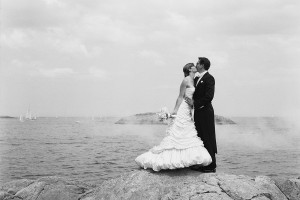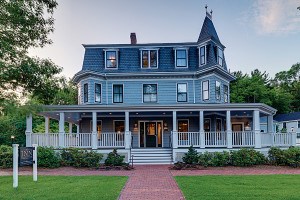How to Pick a Wedding Venue in Boston
Wedding planner Amy Kimball helps couples pick the perfect place for their big day.

Indoor wedding reception venue via Shutterstock
Amy Kimball of Amy Kimball Events tells brides and grooms to get out of own their heads when they visit a venue. In other words: Stop wondering how many people will fit and whether your color palette will work, and instead really experience how you feel when you walk into a space.
“Did you get excited? Were you smiling? Did you feel calm, like no matter what, it will work out in this space?” she asks. “Stay open and go with those feelings. Your guests will always remember your wedding and where you got married, so you want to make sure you feel proud. It’s a reflection of you as a couple.”
It’s true. The venue sets the tone for your entire wedding. Whether it’s formal, relaxed, traditional, or contemporary, it’s the foundation of your entire experience. (No pressure.)
Kimball knows her stuff: Her favorite venues constantly rank as the hottest spots for weddings—from the grandeur of the Fairmont Copley Plaza, the uniqueness of the Liberty Hotel, and waterfront views of the Boston Harbor Hotel. So we asked Kimball for her top advice for picking a wedding venue in Boston.
Start by Making It Personal
Start by asking yourself about your lifestyle, your overall style, your taste, and your priorities for the wedding. “If a couple immediately starts with ‘We’re big outdoors people,’ then that’s an atmosphere to start exploring because it’s where they feel comfortable,” she explains. “If they say they live in the city and their favorite thing to do is go to amazing restaurants, then we start in the city at venues known for their food because that brings them joy.”
This personal and subjective decision is a tough one, so it’s also very important to explore a few different options simultaneously. “If they’re really undecided, I would look at a maximum of three different categories. Once you discuss priorities and budget, you should be able to get to two or three categories—for example, beach, urban, farm,” she says.
Stay Open
Picking a venue is like buying a wedding dress. You think you know exactly what you want, then you try a few things on, and end up with something you didn’t even know you liked. It’s important to stay open through the process. “I had a bride who was convinced she wanted a barn wedding in Vermont,” Kimball remembers. “We went on a few site visits up there, and she didn’t like anything and burst into tears as we drove away from the last spot. We had to re-evaluate.” Decide what’s important and go through your priorities. “People are able to say what they don’t like pretty quickly, and if they feel strongly about not liking something, strike it off the list immediately.”
Use the Space to Tell Your Story
“The setting says a lot about the couple. It should be an environment they feel happy and comfortable in,” says Kimball. For instance, a black-tie wedding in a regal and formal space speaks to the couple that loves to get dressed up and enjoys the traditional wedding. But it doesn’t always have to be that obvious. Sometimes the venue doesn’t exactly fit the couple, and they need to make it their own. “I had one client that, due to having over 300 guests, had to be at a very formal venue. She was more of country girl, so I created the ‘rustic chic’ look in reverse. We brought in farm tables, did bright linens, natural woods in a very grand, glamorous and traditional space. This couple made the wedding ‘them’ despite the venue,” explains Kimball.
Figure Out the Nuts and Bolts
Once you’ve narrowed it down to a locale or two, the final decision may come down to price. Kimball suggests asking for the full estimate at this point. Make sure all the line items are included: taxes, fees, and gratuities, which can end up being up to 30 percent of the original estimate you received. If you’re not using a wedding planner, make sure to meet the venue coordinator you’ll be working with. “It’s important to connect, they’ll be your guide through the process at the venue,” she explains. Now start to ask yourself the questions from a guest’s point of view: Is it easy to get to and from? What about parking? Is accessible to hotels for out-of-towners?
“My favorite types of venues are versatile venues that want to work with you in creative ways and don’t dictate one and only way to have your wedding in their space,” Kimball says. “If you’re in the environment you love and are happy, enjoying yourselves, that’s what translates to the guests and makes for a fun and fabulous wedding.”
What stories do you want to see in Boston Weddings? Send us tips at weddings@bostonmagazine.com.
Getting married? Start and end your wedding planning journey with Boston Weddings' guide to the best wedding vendors in the city.


